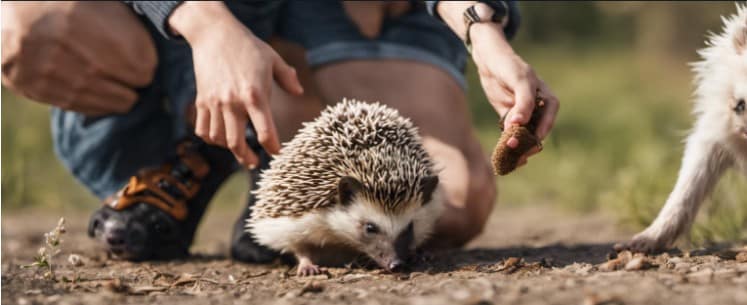Recently my dog attacked and killed a hedgehog in my garden. Since then, I’ve decided to investigate this further and find out if this is a common occurrence so that if you have a hedgehog in your garden or a domestic hedgehog, you can take the necessary precautions.
In this article, we’ll learn why dogs attack wild hedgehogs, as well as provide tips on how to avoid potential attacks from dogs if you have a domestic hedgehog as a pet.
Let’s begin!
Can hedgehog spikes hurt dogs?
Yes, hedgehog spikes can hurt dogs if the dog tries to attack or play with the hedgehog.
The sharp spikes on a hedgehog’s back can cause pain and injury to a dog’s mouth, nose, or paws if they come into contact with them. It’s important to keep dogs away from hedgehogs to prevent any harm.
It is important for dog owners to be aware that dogs may attack hedgehogs if they come across them in the wild or in a backyard setting. Hedgehogs have a natural defense mechanism in the form of spikes covering their bodies, which they can use to protect themselves.
If a dog attempts to bite or engage with a hedgehog, the hedgehog’s spikes can cause pain and injury to the dog’s mouth, paws, or other body parts. It is crucial for dog owners to intervene if their dog encounters a hedgehog to prevent any harm to either animal.
Therefore, it is advisable to keep dogs supervised and on a leash when in areas where hedgehogs may be present.
What do you have to do if your dog has attached a hedgehog?
If your dog has interacted with a hedgehog, but is not showing any signs of distress or injury, there are still important steps you should take to ensure the well-being of both animals.
Hedgehogs can suffer from injuries that are not immediately visible, such as deep puncture wounds from dog bites that can seal over and later become infected, leading to abscesses and other health issues.
Dogs, on the other hand, might sustain injuries from the hedgehog’s spines, which could lead to cuts or scratches that might become infected if not properly treated.
For the Hedgehog
- Separate the Animals: Use a towel or gloves to gently separate the dog from the hedgehog to prevent further stress or injury to either animal.
- Check for Injuries: Even if the hedgehog appears unharmed, it’s crucial to have it checked by a wildlife rescue or vet, as injuries might not be immediately apparent.
- Contact a Wildlife Rescue: Place the hedgehog in a cardboard or plastic box lined with an old towel and contact your local hedgehog rescue or wildlife vet for further instructions.
For the Dog
- Inspect for Injuries: Carefully check your dog’s mouth, muzzle, and paws for any signs of cuts or scratches.
- Clean Any Wounds: If you find any injuries, bathe the affected areas with a saline solution (salt dissolved in boiled water) to clean the wounds.
- Seek Veterinary Care: If the injuries appear severe or if you have any concerns about your dog’s health following the interaction, consult your veterinarian for further advice.
Prevention Tips
- Supervise Encounters: Always supervise your dog when it is outside, especially during the night when hedgehogs are more active.
- Keep Dogs on a Leash: If you know there are hedgehogs in your area, consider keeping your dog on a leash during walks in the evening or at night.
- Educate Your Dog: Training your dog to respond to commands like “leave it” can be helpful in preventing future encounters with hedgehogs.
Why do dogs attack hedgehogs?

Dogs may attack hedgehogs for various reasons, including boredom, excess energy, predatory instinct, territorial behavior, and curiosity. Understanding the cause is essential, as it helps take preventive measures.
When dogs are bored or have too much energy, they may attack hedgehogs as an outlet. The best solution in such cases is to ensure that the dog gets more exercise, like going for walks, runs, or playing fetch.
Signs of boredom in dogs include excessive barking, chewing on inappropriate objects, and lethargy. Providing mental stimulation can also help combat boredom through interactive dog toys or engaging in dog sports such as agility, flyball, and treibball.
If the attack is a result of predatory instincts, it is crucial to seek professional help from a behaviorist or a trainer to address the issue. Dogs are natural predators, making slow-moving hedgehogs a potential target.
Territorial behavior can also lead dogs to attack hedgehogs. In this case, dogs perceive the small animals as intruders in their space and may act aggressively to protect their territory.
Are hedgehogs afraid of dogs?

Hedgehogs generally feel scared of dogs and usually attempt to avoid these encounters. It is essential for pet owners to be mindful of the hedgehog’s fear, as they may defend themselves if they sense danger from a dog. When cornered or trapped, a hedgehog might hiss and display its spines as a warning sign.
These spines are hedgehogs’ primary defense mechanism against predators such as dogs. In a threatening situation, a hedgehog will curl up into a ball, tucking its head and legs beneath its body. Consequently, the spines stand erect, making it challenging for predators to attack or bite them.
For those interested in keeping hedgehogs as pets, it’s crucial to provide a safe shelter and nest to ensure they have an escape route in case of dog encounters. Being aware of their natural instincts and how they interact with dogs is key for responsible pet ownership.
Read also: What Are Hedgehogs Scared Of? (Explained)
What happens if a dog bites a hedgehog?
If a dog bites a hedgehog, the hedgehog’s natural defense mechanism is to curl up into a tight ball, exposing its spines. The spines can protect the hedgehog from the dog’s teeth and prevent serious injury.
However, if the dog persists in attacking the hedgehog, it can cause serious harm to the hedgehog.
The spines can become embedded in the dog’s mouth or throat, causing infection or even death. In addition, the hedgehog may suffer internal injuries from the dog’s bite. It’s important to seek veterinary care for both the dog and the hedgehog if a bite occurs.
Can dogs attack hedgehogs?

We know that dogs can attack hedgehogs, but it’s crucial to understand that not all dogs will exhibit this behavior. Hedgehogs are not typically prey for dogs, so a domesticated dog is unlikely to attack one.
However, feral dogs or unsocialized dogs might see hedgehogs as prey and initiate an attack. As a result, both pet hedgehogs and wild hedgehogs face a considerable threat from dogs. To protect a hedgehog, especially if it’s a pet, we must take precautions to prevent potential dog attacks.
How do we stop dogs from attacking hedgehogs?

Redirect their attention elsewhere
When walking our dog in areas where hedgehogs might be present, we should always use a leash. If our dog starts showing interest in a hedgehog, we must immediately redirect their attention to something else, such as a toy or treat.
Acting promptly and being consistent with commands is essential.
Use a muzzle
If our dog continues to show aggression towards hedgehogs, we may need to consider using a muzzle. This will prevent them from biting or harming the hedgehog.
Use positive reinforcement
Praising our dogs and rewarding them with treats whenever they display good behavior is important. By doing so, they’ll associate hedgehogs with positive experiences instead of negative ones.
With consistent training and positive reinforcement, we should be able to stop our dogs from attacking hedgehogs. If problems persist, consulting a professional trainer or behaviorist is recommended.
Vibrating dog collar
A vibrating dog collar could be a potential solution to prevent our dog from attacking hedgehogs. These collars emit a short, harmless burst of vibration that can help with training by startling the dog and interrupting their train of thought.
To successfully use a vibrating dog collar, we must:
- Ensure the collar is fitted properly and not too loose.
- Supervise our dogs while they wear the collar – never leave them unsupervised.
- Praise our dogs when they respond well to the collar for positive reinforcement.
One popular option on the market is the PatPet vibrating dog collar. It features a range of over 1000ft, three training modes (beep, vibration, beep plus vibration), and a waterproof design.
If you think a vibrating dog collar could be the right solution for your pet, CLICK HERE to check out the PatPet vibrating dog collar on Amazon!
Can hedgehogs survive a dog attack?

We must acknowledge that hedgehogs can survive a dog attack, but their chances are not guaranteed. The injuries sustained during an attack are often severe, and a determined dog can still overpower a hedgehog. If you witness a dog attacking a hedgehog, intervene immediately to stop the attack.
Should the hedgehog be injured, it is crucial to bring it to a veterinarian as soon as possible. Hedgehogs are small animals with fragile bones; even a minor injury could be fatal. Injuries may include:
- Bite wounds: Dogs can cause serious damage with their powerful jaws.
- Hibernation: Injured hedgehogs may struggle to hibernate, affecting their survival.
Please be aware of elastic bands’ dangers to wildlife, as they can cause severe injury or even death to animals like hedgehogs.
Can hedgehog spikes hurt dogs?

Hedgehog spikes can indeed hurt dogs. The needles on a hedgehog’s back are made of keratin, similar to our hair and nails, and are quite sharp and pointy. These spikes can cause puncture wounds on a dog’s skin, which might lead to painful injuries.
We should note that hedgehogs are not naturally aggressive creatures but will defend themselves if they feel threatened. If a dog gets too close and snags one of those sharp spikes on its skin, it could end up with some rather unpleasant wounds.
In any case, this doesn’t mean you should never let your dog near a hedgehog. With proper supervision and a bit of training, our dogs can learn to coexist peacefully with hedgehogs.
If you’re considering getting a hedgehog as a domestic pet, we recommend training your dog before bringing the hedgehog home.
Remember, hedgehogs might seem harmless, but their quills serve as a warning to other animals, making them potentially vulnerable to injuries.
So, it’s essential to prioritize the safety of both your dog and the hedgehog, keeping them at a safe distance from each other, and ensuring encounters are supervised.
Do dogs eat hedgehogs?

In general, dogs don’t eat hedgehogs due to their protective quills. However, some dogs with a tendency to consume peculiar items could pose a risk. It’s crucial to supervise your dog around hedgehogs.
Notably, hedgehogs can carry parasites like fleas, mites, and ticks, which could transfer to a dog upon contact. Although dogs typically don’t eat hedgehogs, ensuring your pet’s safety around these invertebrates is essential.
Why are dogs obsessed with hedgehogs?

Dogs are often fascinated by hedgehogs due to their curiosity and love for exploring new things. Hedgehogs emit a strong scent, which can appeal to dogs with their excellent sense of smell.
The grunting noise hedgehogs make when moving around might attract a dog’s attention, leading them to want to play or chase the hedgehog.
It is crucial for the two species to coexist in harmony because hedgehogs are nocturnal animals that play vital roles in ecosystems. Affording them the opportunity to live their lives undisturbed is important.
Providing supervision when your dog is around a hedgehog is essential; hedgehogs can defend themselves with their sharp quills, and we don’t want our dogs to get hurt.
Summary
Before we move on to the conclusion, we’ve summarized this article into a short list of key points for you to remember:
- Hedgehogs aren’t naturally aggressive animals, but they will defend themselves if they feel threatened.
- Dogs typically won’t eat hedgehogs, but it’s still important to keep an eye on your pet around these animals.
- Dogs may be attracted to hedgehogs because of their intriguing nature, strong scent, and grunting noises.
- If your dog is fixated on hedgehogs, it’s important to provide supervision and make sure they don’t get too close.
Final thoughts
In this article, we’ve learned that while dogs typically don’t attack hedgehogs, there are some exceptions to this rule. If you have a dog that’s prone to eating strange things, it’s best to keep an eye on him around hedgehogs.
Of course, the best way to keep your dog safe around hedgehogs is to provide supervision and make sure they don’t get too close.
We also learned why dogs might be obsessed with hedgehogs in the first place. Most dogs are curious about nature and love exploring new things, so this is perfectly normal behavior.
Want to learn more about hedgehogs?
Ready to boost your knowledge to the next level? If so, check out the articles below:
- Do Hedgehogs Eat Mice? (Explained)
- How Long Can a Hedgehog Be Left Alone? (Read This First!)
- Can Hedgehogs Play With Hamster Balls? (Important Facts)





